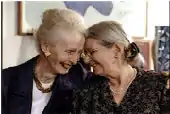Sisters in Resistance
Sisters in Resistance, Soeurs en Resistance, is a television documentary directed by Maia Wechsler initially released in France October 25, 2002,[1] and later premiered on the Public Broadcasting Service (PBS) in the United States April 29, 2003.[2] Four young Frenchwomen who fought against the German occupation of France during World War II, tell their stories of adventure, arrest and deportation to Ravensbrück, a women's concentration camp. The film was narrated by Kate Mulgrew, and starred Geneviève de Gaulle Anthonioz (1920-2002), Jacqueline Péry d'Alincourt (1919-2009), Germaine Tillion (1907-2008) and Anise Postel-Vinay (1922-2020) as themselves. They won Outstanding Documentary by the Academy Award Screening Committee and Best Documentary in the Woman in Cinema Film Festival.[3]
| Sisters in Resistance | |
|---|---|
 Jacqueline Pery and Geneviève de Gaulle | |
| Directed by | Maia Wechsler |
| Narrated by | Kate Mulgrew |
Release date | 2002 |
Running time | 60 minutes |
| Country | USA |
| Language | French with English subtitles |
Summary
When Germany invaded France in May 1940, a small group of young French women in their early twenties, recognized the threat that the Nazis posed and accepted assignments in the Resistance Movement. They transported secret military correspondence, made protest flyers, tore down Nazi flags, and hid Jews from the Nazis. Sisters in Resistance follows Jacqueline Pery, Anise Postel-Vinay, Germaine Tillion, and Geneviève de Gaulle-Anthonioz, niece of Charles de Gaulle, through their war-time experiences and survival together in Ravensbrück concentration camp.
All four woman clearly recognized the danger they were putting themselves into, but that didn't stop them from doing what they believed was right. Jaqueline says she remembers the first time she saw a small Jewish child branded by a bright yellow Star of David. She was disgusted and horrified. It was then that she realized, "I was ready to lose my life. I had to fight."
But their actions had consequences. All four were arrested, imprisoned, tortured, and sent to Ravensbrück concentration camp. There, these Gentiles suffered alongside the Jews. Just as their solidarity gave them courage to fight against German occupation, so too simple acts of friendship and kindness helped them survive in Ravensbrück. Every day Germaine would give her friend a little piece of her bread, saying insistently, "Take it. You're young. You'll survive, marry, and have ten children."
Although they witnessed death all around them, all four friends survived. They said the inhumanity they experienced during the Holocaust only encouraged them to continue fighting for human rights and justice. After being released from the concentration camp, they went off in different directions, but continued to work for humanitarianism. Jacqueline moved to America and lectured to students about her war-time experiences, Germaine denounced France's military use of torture in the Algerian War for independence, Anise documented the use of poison gas in Ravensbrück concentration amp, and Geneviève lead an international movement to help the poor and the less fortunate.
At the end of the documentary, Geneviève quotes French writer André Malraux, saying, "The only response to absolute evil is fraternity."
Production
Red Triangle Production Company[4]
See also
Other documentaries about Holocaust survivors:
References
- Wechsler, Maia. Soeurs En Résistance. Red Triangle Productions, 2002.
- PBS. “Sisters in Resistance | Documentary | Independent Lens |.” Independent Lens, https://www.pbs.org/independentlens/documentaries/sistersinresistance/. Accessed 6 Aug. 2023.
- Women Make Movies, WMM. Sisters in Resistance. 2000, https://www.wmm.com/catalog/film/sisters-in-resistance.
- “Red Triangle Productions.” IMDb, http://www.imdb.com/search/title/?companies=co0101058.